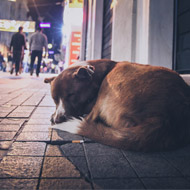Street Paws issues Halloween plea to partygoers

Winter is a particularly difficult time for homeless people and their pets.
Partygoers are being asked not to approach homeless people and their pets when wearing fancy dress costumes this Halloween.
The plea comes from leading animal charity Street Paws, an organisation that provides free veterinary care to animals owned by the homeless or vulnerably housed.
Street Paws founder Michelle Southern said that seeing people in scary outfits can be terrifying for dogs.
“It’s scary enough being homeless and not only being worried about your own safety but your pet as well,” she said. “But at Halloween, it’s even more stressful for homeless people as there are so many revellers out in fancy dress costumes.
“For a dog living on the street, they have no idea why people are dressed up, and it can make them very stressed and anxious if people run up and shout and try to scare them.”
Besides supporting homeless dogs, Street Paws has also cared for several cats across the UK. Among the services provided by its 150-strong team include health checks, flea and worming treatments and vaccinations.
The charity was founded in Newcastle in 2016 after Michelle, a former practice manager, recognised there was a lack of support for homeless pets.
“Winter is a difficult time for our clients and their animals with the cold weather, fireworks and Halloween and Christmas parties making many city centres intimidating places,” Michelle continued. “We understand that people want to celebrate and have fun, we just ask that they are considerate to the animals and their owners and leave them alone and don’t set off fireworks near them.
“If they do want to help, ask if they would like a warm drink or some water or food for their dog. Sometimes showing a little kindness by simply stopping to say hello is enough to lift their spirits.”



 The Veterinary Medicines Directorate (VMD) is inviting applications from veterinary students to attend a one-week extramural studies (EMS) placement in July 2026.
The Veterinary Medicines Directorate (VMD) is inviting applications from veterinary students to attend a one-week extramural studies (EMS) placement in July 2026.